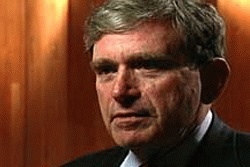|
C. Robert Zelnick worked as a reporter and columnist for the Anchorage Daily News during the late 1960s and early 1970s. He later moved to the Lower 48 to work in television news reporting, for which he won two Emmy awards. Zelnick is the author of Backfire, A Reporter's Look at Affirmative Action (Regnery, 1996), and is currently a professor of journalism at Boston University.
Ronald Spatz: From your perspective, what was the promise of ANCSA?
 |
| C. Robert Zelnick |
 |
C. Robert Zelnick: I think the promise, first of all, was justice for the Alaska Natives who had been dispossessed without war for much of their lands and were fighting to retain rights to the remainder and to sustain their way of life. Secondly, the promise was economic development. I think third of all, the promise was the development of the new generation of Native leaders who would be able to continue and expand the prosperity on the base of the Land Claims Settlement.
Ronald Spatz: Do you think those promises have been fulfilled?
C. Robert Zelnick: I think it's a mixed picture. In some respects we can celebrate the fact that new Native leadership has emerged, that many of the individual corporations are doing very, very well -- Arctic Slope with its near-billion-dollar annual income. I think, on the other hand, if you look at the situation in rural Alaska, the problems continue -- underemployment, unemployment, high rates of mortality, high rates of suicide, terrible social problems of alcoholism and the like. The ultimate question as to whether that kind of life is sustainable in this day and age remains unanswered.
Ronald Spatz: Have you seen any unintended consequences of ANCSA?
C. Robert Zelnick: I don't think there've been any big surprises, except I thought that within a fairly short period, the Native corporations and thus the Native political leadership would be at war with the environmentalists, because the interest of the Native corporations now is economic development, and of course, the conservationists or preservationists as some call them, have become increasingly militant with respect to Alaska. It hasn't happened, at least not in the open. I suspect it still may.
Ronald Spatz: What do you think the future holds?
C. Robert Zelnick: Before very many years have passed, we're going to have the ultimate question answered -- and that is whether a prosperous modern life is sustainable in communities out in the rural areas where the populations today are 25, 50, 75, 100, 200 in a village, and where there is no particular resource base to create this prosperity.
I think it's sometimes a willful notion that the residents will be happy and satisfied chasing down caribous on snowmobiles and fishing from motorboats. I think the truth may lie elsewhere.
Ronald Spatz: What's your favorite ANCSA story?
C. Robert Zelnick: The favorite ANCSA story that I can tell is really less of an anecdote than a moment of decision, and that is when Wally Hickel was up for confirmation as Secretary of Interior. There was massive state-wide pressure on the newly vigorous Alaska Federation of Natives to go down to Washington, say what a great guy he was, and endorse him.
And, on the other hand, there were some pressures from people who had questions about Hickel's dealings with the Natives during his period as governor to say not only hold out, but say no, this is the time to settle accounts.
I think it was the first major decision that the infant leadership of AFN had to make. What they did was extract a firm commitment from Hickel to keep the land freeze on pending settlement of the Alaska Native Land Claims -- and then they endorsed him. I think that was an act of courage, and I think it was an act of political maturity well beyond the years of the Alaska leadership.
|




